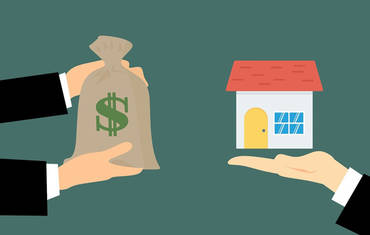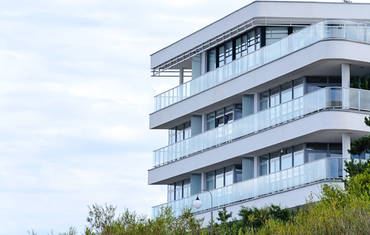Real Estate Advice
July 01, 2025
Water damage: what to do?
In 2023, water damage accounted for 34% of all home insurance claims in France! What should you do if it happens to you?

With nearly 1.4 million claims filed in France in 2023, water damage is by far the most frequent type of incident in homes. If you're affected, you're probably asking yourself: how can I find the source of the water damage? What steps should I take? What can I expect from my insurance? Luckily, your real estate agency in Nice, Winter immobilier, answers all these questions in this article. Enjoy the read!
Identifying the source of the water damage
Do you suspect water damage in your property? Before anything else, you need to understand where the water is coming from. Depending on the origin of the issue, responsibilities and insurance coverage will differ.
To do this, start by asking the right questions:
- Is the water coming from the ceiling? A wall? The floor?
- Is it a sudden leak or a slow but persistent infiltration?
- Is the problem in your unit, a neighbor’s, or in a common area?
There are several possible causes. It might be a leak inside your apartment: a faulty hose, a broken water heater, or simply a poorly closed faucet. Sometimes the damage comes from the floor above or a neighboring unit. In other cases, water seeps in through the roof, the façade, or a defective pipe in the shared areas.
If the source isn’t obvious, don’t wait. Call in a professional (plumber, property manager, or expert) to quickly locate the issue. And if your property is managed by a real estate agency, they can take care of the coordination for you.
The sooner the source is identified, the sooner the issue can be resolved!
Steps to take
Once the source of the water damage is identified (or being investigated), there’s no time to waste. You need to act quickly and efficiently to limit the damage and keep things from escalating.
Here are the steps to follow:
- Act fast to stop the damage: if the leak is still active, turn off the water (and electricity if needed). Call an emergency plumber, especially if the issue comes from your unit’s plumbing. At the same time, take photos or videos of the affected areas and any damage. These will be useful for your insurance claim.
- Fill out a water damage report: this document is essential. It must be completed with the other involved parties: the tenant, a neighbor, or the property manager if common areas are affected.
- Inform other residents or the property manager: if the damage comes from another unit or a common area, let your neighbors or building manager know immediately. Their response is crucial to avoid worsening the situation or spreading damage to other units.
- Report the damage to your insurance: you have 5 business days from the discovery of the damage to file a claim with your insurer.
The claim should include:
- the completed water damage report,
- a detailed description of the damage,
- photos or videos of the affected areas,
- contact information of the involved parties,
- the date of the incident and the suspected cause.
Insurance involvement
Once the claim is filed, the case is in the hands of the insurance companies.
In some cases, the insurer will appoint an expert to assess the damage, determine liability, and estimate repair costs.
For smaller incidents, however, insurers often rely on the IRSI agreement, which simplifies the process between companies and often avoids the need for an expert.
If the damage affects several units or common areas, each insurance company handles its share. Compensation depends on your policy, who is found responsible, and your level of coverage. Structural damage (ceilings, walls, floors) is generally covered.
Good to know: insurance procedures are rarely fast or straightforward. It’s a technical and lengthy process, and even small mistakes can delay or reduce your compensation.
Repairs and who pays for what
After the insurance process, it’s time for repairs.
The property owner is responsible for everything related to the structure of the property (walls, floors, ceilings), outdated or faulty equipment (water heater, embedded piping, etc.), and any restoration work needed after the water damage, even if a third party caused the incident.
Are you a landlord? Your tenant is responsible for routine maintenance of the property. If the damage was caused by their negligence (an open tap, a loose hose, lack of upkeep), they can be held liable, and their insurance will have to step in.
But if the incident wasn’t their fault, you, the property owner, must manage and pay for the repairs.
And if the apartment is unoccupied during repairs? That’s a potential loss of rental income, which can sometimes be covered by your insurance—but only if that scenario is included in your policy.
Water damage in Nice: a common issue
In Nice, water damage is widespread, especially in older buildings in the city center or near the coast. The main cause? Often, outdated piping.
Most wastewater pipes in shared buildings are made of cast iron, with an estimated lifespan of about 70 years. But many buildings in Nice date back to the post-war period—or even earlier—and haven’t always been fully renovated.
The result: leaks, infiltration, and broken pipes are frequent occurrences.
Water damage and the role of a rental property management agency
If you’ve ever handled a water damage issue alone, you know how time-consuming, stressful, and energy-draining each step can be. This is exactly where a rental property management agency like Winter immobilier in Nice comes in.
We take care of:
- Filing the claim on your behalf,
- Communicating with the insurer, building manager, and neighbors,
- Coordinating with experts,
- Selecting contractors,
- Overseeing the repair work,
- Keeping the tenant informed on a regular basis.
Our agency also works with reliable and responsive professionals who are used to handling emergency repairs in rental properties. Our real estate experts know how to negotiate with insurers, navigate complex agreements, and protect your interests efficiently.
In case of a dispute or a problem, we step in on your behalf. That way, you avoid conflict with the tenant, procedural errors, or costly oversights.
Key takeaways
- Water damage accounts for 34% of home insurance claims in France.
- Acting quickly helps limit the damage and ensures better coverage.
- You have 5 business days to declare the incident to your insurance.
- Responsibility depends on the source of the issue and property maintenance.
- A property management agency handles everything from reports to repairs.
Phone calls, paperwork, unclear responsibilities, impatient tenants, a property that’s deteriorating... Water damage is never fun, and if you’re an unassisted landlord, it can quickly become a real uphill battle.
Have you already dealt with water damage as a landlord? Are you worried about the complex process if it happens again?
Entrusting the rental management of your property in Nice to an agency means handing over all the hassle to professionals. At Winter immobilier, we handle claims, insurance relations, communication with the building manager, tenants and contractors—and most importantly, we take care of your peace of mind.
Don’t wait—click here to contact us!






